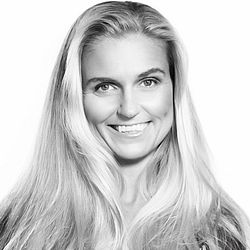
News -
WHY KEEPING YOURSELF FIT REALLY CAN MAKE FOR A FITTER PLANET
Anyone who’s honest will admit to an occasional sense of powerlessness and even futility in the face of overwhelmingly negative headlines about climate change and looming environmental disaster. One individual in a sea of humanity, it can seem, can’t really make a difference.
And it’s true, the links between global environmental sustainability and personal action can sometimes be hard to see – especially given our busy lives and the everyday demands of home and work.
Yet there is plenty of evidence that the choices we make about personal health, diet and exercise can make a powerful contribution to the health of our planet.
Phillip Mills, CEO of Les Mills, joined those dots some time ago – including co-authoring Fighting Globesity: A Practical Guide to Personal Health and Global Sustainability, published in 2007. “What populations eat and how they move around are two things that have tremendous influence on both the world’s environment and society,” he says. “What we do as individuals adds up to what we do as a community.”
That personal philosophy has seen Phillip become a passionate advocate for fitness as one solution to the global blight of obesity, and a staunch promoter of sustainability goals within the business.
The LES MILLS vision of “a fitter planet” works on several levels: by creating experiences that make people fall in love with fitness the collective behavior of many individuals can make a positive difference to the health of our environment. It also means the company itself is committed to environmental sustainability.
Over the past year, LES MILLS has gone through an extensive process of calculating its own carbon footprint, and having this independently verified. After investigating various options for offsetting its carbon emissions, the company has chosen the Kariba REDD+ Project, a scheme to protect and develop an existing forest in Zimbabwe. The company also took into account additional offsets to cover the five international LES MILLS offices, and will be working towards having them included in the overall calculations in the near future.
The Kariba REDD+ initiative grew from the local community as a response to the deforestation and economic decline they were witnessing. By encouraging sustainable agricultural practices and improving productivity, the pressure on the remaining forest is greatly reduced. An ancient forest of mature trees also happens to be an ideal weapon in the war against global warming.
Because trees soak up and store CO2 from the air – a process known as “sequestration” – projects such as Kariba REDD+ offer a viable way for business and industry to offset emissions and contribute to the greater good of the planet.
Even a two-degree increase in average temperatures will be catastrophic at an environmental and human level,” says Phillip. But just getting to that point, we are seeing the consequences in droughts, sea level rises, climate refugees, worse storms and so on. There is no alternative to taking action now.”
Data released by NASA this year showed the average global surface temperature in February was 1.35C warmer than the average temperature for the same month between 1951-1980. According to the latest analysis of climate change in Antarctica, if the world continues to emit "business as usual" levels of carbon dioxide, sea-levels could increase over the coming century by twice as much as earlier estimates.
Apocalypse soon, then. But while these might sound like factors beyond your control, chances are if you’re reading this you are probably already ticking a few boxes. You can even calculate your own personal carbon footprint as a way to see at a glance what it might take to become a carbon neutral citizen.
By caring about your own health and fitness you are already having a positive effect – beginning with what you eat. Essentially, the more weight we put on, the worse it is for the planet. In the US alone it has been estimated that almost 10 million extra tonnes of CO2 are released annually as a result of dietary and fitness habits, a direct result of carbon emissions from land use, food production, transportation and the sedentary lifestyles that lead to greater car use. A population in which 40% of people are obese, it has been calculated, requires 19% more food energy than a population in which there is a normal BMI distribution1.
One small solution is to learn the value of eating foods that are in season. It’s good for your local economy and it means your food isn’t traveling long distances by planes, trains, trucks, and ships. If that isn’t incentive enough, local produce is often fresher, better tasting, and contains fewer preservatives.
Similarly, the choices we make around personal transport can make a real difference. One of the best things we can do for the planet and our own health is to walk and cycle more, and drive less. It takes about five percent of the materials and energy used to make a car to build a bike; cycling produces zero pollution. Your health, both mental and physical, improves, and your carbon-footprint drops.It’s been estimated that if only 5% of New Yorkers currently commuting by private car or taxi switched to biking, it would cut CO2 emissions by more than 68,000 tonnes a year2.
Such a reduction would be the equivalent of planting a forest 1.3 times the size of Manhattan3. Now imagine we were doing both – reducing our personal and collective carbon footprints … and planting trees. One initiative LES MILLS is getting behind, as part of its affiliation with the not-for-profit Pure Advantage group, is Our Forest Future, a discussion paper authored by Dr David Hall and released on Earth Day, aimed at encouraging a national tree-planting strategy.
The same philosophy has also been implemented at a local level as part of the company’s wider social responsibility program. Last year, the LES MILLS Auckland marketing team spent a day planting hundreds of trees on the island of Motutapu with the Motutapu Restoration Trust.
Of course, no one should pretend that solving problems on a planetary scale is as simple as going to the gym, eating well and supporting your local organic grocer.
But imagine if the trillions of dollars spent each year on health issues related to inactivity, poor eating habits and stress were freed up to fight climate change. Again, your own personal contribution might seem miniscule, but the truth is we’re all in this together, and everything is connected.
"We want to make every day Earth Day,” says Phillip. “Every company has a moral obligation to play its part in securing our future, and Earth Day is just a great chance to reflect on what all of us can do, individually and collectively.”
- Jacobson, S., and D. King, 2009-Measuring the potential for automobile fuel savings in the US: The impact of obesity, Transportation Research Part D: Transport and Environment, 14, 6-13
- Transportation Alternatives, 2008-Rolling Carbon: Greenhouse Gas Emissions from Commuting in New York City

